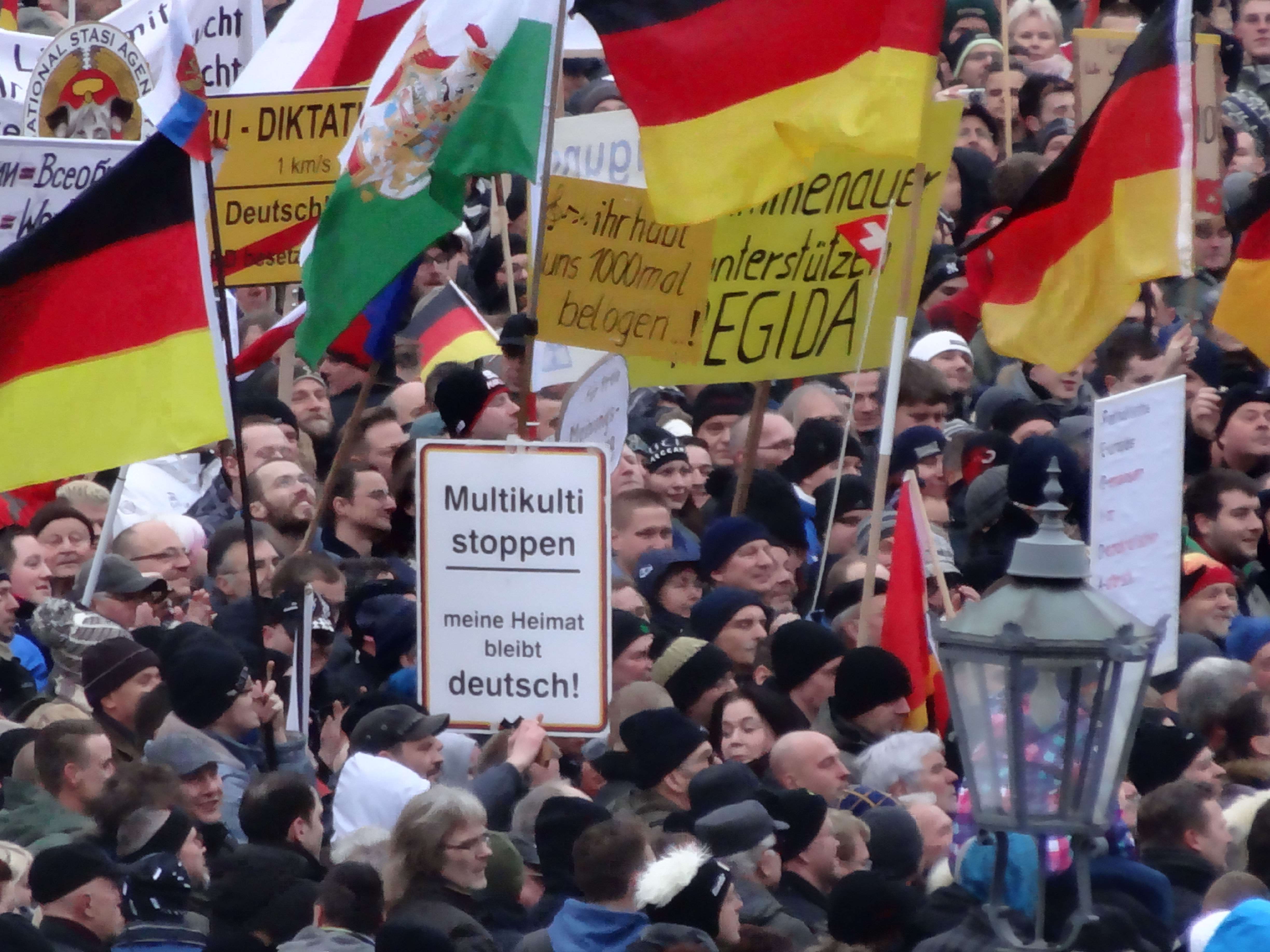Would it not be easier
In that case for the government
To dissolve the people
And elect another?
Bertolt Brecht, ‘The Solution’, 1953
Following current debates on ‘populism’, one sometimes gets the impression that it is primarily a case of upper-class individuals expressing their disgust for the lower classes. These have been ignoring advice – offered of course, with the best of intentions and for many good reasons – and voting differently: for the economically ruinous and completely irrational Leave, instead of the sensible Remain; for a troll as president instead of an experienced, serious career politician; and for a relapse into atavisms such as isolation, nationalism and xenophobia, instead of cosmopolitanism, the United States of Europe and ‘humanity’. But what to do if people don’t vote how they should? Abolish elections to save democracy – as was recently proposed by David van Reybrouck? Or simply exclude the idiots – as Jason Brennan has suggested?
For the Democrats in America, Trump’s links to Russia ought to pave the way for his impeachment, as a way of correcting the American people’s historic mistake of not electing Hillary Clinton. One sometimes wonders who is going mad here – the populists or a milieu that calls itself liberal but flirts with fantasies of tyrannicide? Maybe it is both?
Given the present debate, there is much to say for Ralf Dahrendorf’s definition of ‘populist’ as a popular term for a politician with a different opinion. If it is correct, it would essentially bring the debate to an immediate halt. Yet an alternative definition has been suggested some time ago by Jan-Werner Müller, one that almost everyone seems to be able agree on. It claims not to use the term populism as political polemic, and instead to understand it in a purely formal sense, without any substantive orientation. It focuses on populists’ claim to be the sole arbiters of truth, on their overt anti-pluralism – as when they contrast the ‘true people’ in whose name they profess to speak with the corrupt and out-of-touch elite.
For Müller, ‘populism isn’t about policy content’ but ‘always a form of identity politics’ – ‘us against them’. More precisely, it is a form of identity politics that denies its opponents’ all legitimacy. This is in line with Cas Mudde’s position when he talks of populism as a ‘thin ideology’ (‘a set of ideas that appears in combination with quite different, and sometimes contradictory, ideologies’) that is ‘unrelated to the left/right distinction’. The president of Germany’s constitutional court, Andreas Voßkuhle, argues that populism ‘can be combined with almost any substantive orientation’ and that ‘a populist movement is indistinguishable from a non-populist movement in terms of its concrete political objectives’. Despite the lack of clarity, one thing is supposedly beyond doubt: ‘that populism is more form than content, more style than programme’.
But is that actually true? Is it enough to see populism solely as anti-pluralism, to understand it merely as an intense form of exclusionary political rhetoric? Doesn’t that make the object of conflict irrelevant? If populism is more form than content, more style than programme, then criticism of it risks becoming a critique of mere style: an irked middle class requesting that the unwashed please take a bath before taking their seats at the discursive table. As long as they don’t, there will be no need to engage with what they say – a pleasant side effect and, of course, entirely unintended!
However, engagement with populist movements is unavoidable, not least because, in political practice, the anti-pluralist definition constantly contradicts itself. The implication ‘Come back when you’ve stopped foaming from the mouth’ is dishonest and primarily a way to reassure an insecure middle-class. Essentially, all it does is confirm populist narratives of exclusion. What is needed instead is a substantive concept of populism, one able to answer questions of variance – why populism manifests on the right in some places and, in others, on the left. For populism is not, as Mudde argues, disconnected from left and right. This view is analytically imprecise, I suggest. The point is, rather, that populism is sometimes associated with the left and sometimes with the right, and that this is so for systemic and not just contingent reasons. By investigating the causes of these differences, and engaging with the political content of populist arguments, it might be possible to develop a better understanding of this increasingly prevalent form of protest politics.

PEGIDA Demonstration in Dresden, Germany (2015) Photo source: Wiki Commons
The unwashed
Disregarding the substance of populism and focusing exclusively on its exclusionary rhetoric may succeed in protecting the definition of populism from everyday polemic, however it also allows one to ignore the political issues, in other words what populists are actually saying and why. This, at least, is compatible with the prevailing view that populist positions are so obviously irrational that there is no point in bothering to discuss them anyway. However, this is nothing but the abjuration of the pluralist claim bandied about to characterise populism in the first place. In particular, it enables avoidance of basic questions of redistribution and scarcity, such as that of the losers of cosmopolitan humanitarianism: a question that the (German) middle class no longer likes to talk about, because it hardly comes into contact with them.
The same goes for questions about the democratic legitimacy of the European Union, towards which in Germany an attitude of bourgeois conservativism reminiscent of the imperial period increasingly prevails. In other words, political participation is gladly forsaken in favour of submission to a legalistic European technocracy, on the condition that it takes care of a functioning market economy. But not everyone profits equally from that economy, meaning that the trade-off between political loss and economic gain doesn’t leave everyone quite so nonchalant about Europe’s manifest democratic deficit.
Without wishing to be cynical, it doesn’t seem entirely irrelevant that maximal cosmopolitan morality tends chiefly to be endorsed by people with a certain set of socio-economic characteristics. To put it another way: such ideas are seldom heard from people working in the low-pay service sector. That the German Social Democratic Party is no longer a party of the working class, and that it now represents workers’ interests only in exceptional cases, can be confirmed by looking at any random survey of the social make-up of its leadership. Is it the workers’ fault, then, if they no longer feel represented?
And yet, if the elite systematically ignores the socio-economic preconditions not only of its own attitudes, but also of the attitudes of those that disagree, and instead attempts to conduct the debate solely in terms of morality, then it will fail. As Ivan Krastev argues, the inability of liberal elites to have a debate on migration, and to claim that the policies of the past few years have been a win-win situation for all involved, have led to liberalism being seen by many as synonymous with hypocrisy. Self-righteousness predictably outrages the losers. But is this outrage illegitimate merely because it is ‘shrill’? And who is to judge that anyway? Why should the outraged parties care about such accusations? A concept of populism based solely on the vehemence of its isolationist rhetoric becomes partisan, because it is implicitly associated with the status quo. It becomes a way for the elites to reassure themselves: criticism of us is populist – and thus illegitimate. Populism is interpreted from the perspective of the same elites that have been diagnosed by an increasing number of citizens as the problem.
Schisms
When it comes to the precise socio-economic characteristics of populist voters, there has so far been no unequivocal evidence of any specific predisposition amongst particular groups within society or the labour market. The picture is complex, contradictory and varies widely between countries. That said, it is impossible to overlook certain correlations, for instance the confrontation in the United States between the ‘deplorables’ in the heart of the country and the ‘bicoastal elite’. Similar urban-rural divisions are obvious in the case of Brexit, and they also mark the lines of conflict in Poland, Hungary and Turkey, where PiS, Fidesz and the AKP mobilize the traditionally religious and conservative countryside against the urban elites in Warsaw, Budapest, Brussels and Istanbul. It is plausible that underlying these conflicts is an unequal distribution of life chances and economic prospects. It is certainly the case that cultural factors come on top of these conflicts and magnify them, but it cannot seriously be disputed that the bulk of those in eastern Europe who feel they have lost out under globalization are located in rural areas or in the old centres of mining and heavy industry, and that the winners tend to be based in the cities. Nor can it be disputed that joining the EU has suddenly brought traditional rural structures in central and eastern Europe into competition with high-tech and heavily funded western European agriculture. Should we then shoot the messenger of the bad news that globalization – in the form of Europeanization – also produces losers?
Of course, this neither excuses nor justifies the undermining of the separation of powers, whether in the form of attacks on the independent judiciary in Poland or the emasculation of the independent media in Hungary. But it is unclear whether this is a symptom of rightwing populist regimes in general, or specific to eastern Europe’s transformed nations; something similar is taking place in Romania, for instance, but without being connected to strong anti-EU rhetoric. Moreover, sociological understanding of these trends needs to be separated from political condemnation. Those who argue that phrases like ‘the losers of globalization’ patronize or pathologize certain social classes fail to understand that their formal but intrinsically moralistic concept of populism is more patronizing still.
Equally, when contrasting levels of support for the AfD between the electorates of western and eastern Germany, we should take into account that reunification in East was inextricably linked to a radical economic shock that for many people led to periods of unemployment, and for many more introduced the very possibility of such a thing into everyday reality. It is true that the welfare state was able to cushion the blow of unemployment far more generously than in Poland, Hungary, Romania and other countries after 1989; but the fact remains that, in eastern Germany, many people’s education and employment histories threatened to become virtually worthless from one moment to the next.
Given this experience, it is hardly surprising that the drastic reduction of the length of unemployment benefits introduced in connection with the so-called Agenda 2010 is seen differently in the East than in the West. Nor should it be a surprise that such biographical experiences may cause eastern Germans to view regulations concerning asylum seekers’ entitlement to benefits, and the refugee crisis of 2015 as such, in a different light. So, when all the armchair ethnologists and hobby psychologists hold forth about the ‘east German character’, with no factor too abstruse as to explain the eastern German predisposition to fascism, then it says a lot about the distribution of power in German political discourse. Beyond that, however, it generally says little.
The losers of tomorrow
At the very least, we should not exclude the possibility that specific socio-economic situations exist that give rise to populist protest and that determine the political direction that such protest takes. Such mechanisms are not to be underestimated since, as Ivan Krastev writes, ‘often the new populism represents not yesterday’s losers, but those who expect to be tomorrow’s losers’. In other words, the trend is not necessarily about the losers as such, but those who have something to lose. However, this cannot be straightforwardly interpreted from the data, and the relation between voting for extremist parties and deprivation is probably not linear: those who are truly excluded often don’t vote at all anymore.
Of course, it could also be possible that we are dealing with a culture war – a backlash against the shift in values taking place since the 1970s – rather than the economic problems of the losers of modernization. Or perhaps it is a complex combination of culture wars and distributive struggles. But the answers to these questions, open as they are, should not be prejudiced by a specific concept of populism, since to do so is to rule out saying anything meaningful about variances in populist politics. A concept of populism that explicitly disregards the form populism takes – whether it is leftwing or rightwing, xenophobic or vulgar Marxist – necessarily falls short. Why is leftwing populism more prominent in southern Europe (e.g. Syriza, Podemos, Cinque Stelle, La France insoumise) and rightwing populism more prominent in northern and continental Europe? Why is there variance not just between west and east in Germany, but also between north and south in terms of support for the AfD? In the regional election in Baden-Württemberg in 2016, the AfD came third with 15.1 per cent, 2.4 per cent ahead of the Social Democrats. Was there no western television in Baden-Württemberg for half a century? Had no one met any foreigners until after the fall of the Iron Curtain? Had ‘re-education’ after 1945 failed? Many of those ad-hoc explanations for the alleged east German affinity towards the populist right clearly fail to explain the AfD’s electoral success in Germany’s prosperous, booming, industrial south.
In the parliamentary elections of 2017, the AfD achieved its best results in the wealthiest regions in the east and west of the country respectively. If we compare this to Italy’s political geography, where the Lega Nord is stronger in the north than in the south, one might hypothesise that hostility to immigration is more likely in relatively prosperous regions, where people perceive an increasing imbalance between what they contribute to the (welfare) state in terms of taxes and contributions, and what the state spends on them. It should therefore not be at all surprising that statistical analyses, both at the national level and between European countries, indicate no direct correlation between deprivation and support for populist parties. That does not necessarily mean that there are no economic causes of populism. The cultural explanation struggles to account for why a shift in values across the whole of society should provoke a backlash with such wide regional variations. After all, the populist left – whether Syriza, Podemos or La France insoumise – take to the streets to protest not against gay marriage, but the euro.
It is far from clear how viable any concept of populism can be that rests on the claim of sole moral legitimacy. The rhetoric of exclusion swings both ways. There are plenty of examples of how liberalism combines social tolerance with political intolerance: sympathy for every form of social difference coupled with a lack of sympathy for anything politically different. The exclusionary language of the street (‘We are the people’) comes up against a different kind of exclusion by the elite. In both cases, it is always clear who belongs to what category and who does not. One can and should call a racist a racist. However, it is unclear why a different concept has been invented for ‘racist’ – i.e. ‘populist’ – if not to associate and dissociate, and to defend the status quo.
What now?
What does this mean for our understanding of the new populism? That we should take the political content of each individual variant of populism seriously. Only then can it be countered politically, as opposed to morally, or stylistically. Plausible arguments – for instance by Harvard economist Dani Rodrik – have been made for a comparative understanding of the different varieties of populism in Europe and elsewhere, and of the interconnections between, on the one hand, economic growth models, welfare states and international economic integration and, on the other hand, the challenges posed by globalization and populist protests against it.
Leftwing populism in southern Europe seems to be a reaction to the crisis caused by a model of growth that, for demand to be stimulated, would require fiscal and monetary sovereignty at the national level – a sovereignty, however, that was surrendered with the introduction of the euro. The rightwing populism of northern Europe, by contrast, should be understood not as a reaction to the consequences of losing national monetary sovereignty, but of losing sovereignty over national borders. The issue is thus, on the one hand, the free movement of goods and money and its distributive effects and, on the other hand, the distributive consequences of the free movement of people. Explained thus, the countries of eastern Europe are similar to those of the North, with the difference that in eastern Europe there is support for internal immigration within the bloc, while migration from outside Europe is rejected all the more emphatically. But here, too, the single market produces losers – and these are the ones being mobilized by parties like PiS and Fidesz.
An explanation of this sort should be placed in a longer-term context. As I see it, populist protest can be viewed as protest against globalization, against the background of the liberal hegemony in place since 1990, so aptly described by Francis Fukuyama. But this should not tempt us into bringing into play an undifferentiated concept of ‘neoliberalism’, since that would lump together the very different political economies of Europe and North and South America, and overlook the fact that over the last thirty years these have given rise to very different groups of ‘losers’ and groups of people with something to lose.
The Political Economy of Populism by Philip Manow will be published by Suhrkamp Verlag in November.







